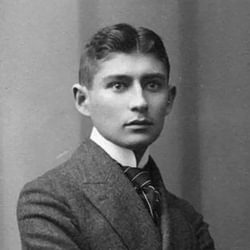The Care of The Householder
Some say the word Odradek comes from Slavic and they try to prove the formation of the word on the basis of this. Others believe that it comes from German and that it is only influenced by Slavonic . The uncertainty of both interpretations, however, leads one rightly to the conclusion that neither is applicable, especially since one cannot find a meaning of the word with either of them.
Of course, no one would bother with such studies unless there really was a being called Odradek. At first glance it looks like a flat, star-like bobbin of thread, and in fact it appears to be covered with thread; However, it should only be torn, old, knotted, but also entangled pieces of thread of various types and colors. But it is not just a coil, but a small cross rod comes out from the center of the star and another rod is attached to this rod at a right angle. With the help of this latter rod on one side, and one of the emanations of the star on the other, the whole thing can stand upright as if on two legs.
One would be tempted to believe that this structure used to have some practical form and that now it has only broken. But this does not seem to be the case; at least there is no evidence of it; Nowhere are any beginnings or breaks to be seen that would indicate something of the kind; the whole thing seems pointless, but closed in its way. Incidentally, no details can be said about it, since Odradek is extremely agile and cannot be caught.
He stays alternately in the attic, in the stairwell, in the corridors, in the hallway. Sometimes he cannot be seen for months; since he has probably moved to other houses; but then he inevitably returns to our house. Sometimes, when you step out the door and he is leaning against the banister, you feel like talking to him. Of course, you don't ask difficult questions of him, you treat him - even his tiny size seduces - like a child. "What's your name?" One asks him. "Odradek," he says. "And where do you live?" "Indefinite residence," he says and laughs; but it is only a laugh that can be produced without lungs. It sounds like the rustling of fallen leaves. This usually ends the conversation. Incidentally, even these answers are not always available; it is often mute for a long time, like the wood it appears to be.
I wonder in vain what will happen to him. Can he die? Everything that dies previously had a kind of goal, a kind of activity, and that's what rubbed it off; that is not the case with Odradek. Should he one day roll down the stairs with the thread of thread loosening in front of the feet of my children and grandchildren? Obviously he doesn't harm anyone; but the idea that he should survive me is an almost painful one for me.
Literary icon whose "Kafkaesque" works, like "The Metamorphosis," probe alienation and existential absurdity.
